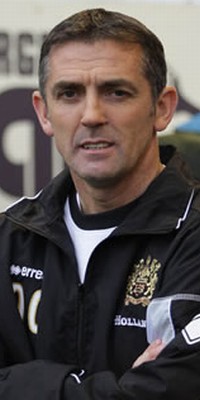|
The opportunity to manage Bolton Wanderers does not represent the opportunity of a lifetime.
A bigger club than Burnley they may be right now. We are trying to provide for the future and build an infrastructure whilst also building a Premier League squad. Bolton have greater revenues than Burnley and can concentrate all that income on building a team.
But the gulf is not so large and nor is the difference in long-term potential.
Certainly, the proposition should not have provoked Coyle to embark upon the unseemly affair of the last week. Not midway through the season which could have defined his tenure at Turf Moor. Not for a team two places below the Clarets, a direct relegation rival.
It isn't, as some have said, just another example of an ordinary bloke switching jobs. For one thing, Coyle is a senior executive, responsible for recruiting staff and dictating long-term strategy. He's paid as such. And, irrespective of the industry in which he operates, with that status and remuneration comes a responsibility to have regard for the interests of that organisation - and the paymasters who invested money and faith in him and his project.
But more particularly, football isn't a normal, dispassionate industry and managers above all know this. If the chief executive of a 'normal' business leaves it in the lurch he betrays the trust of only his staff. A football manager betrays that of thousands of loyal supporters, too; perhaps even a whole community. Football managers are not only well rewarded because it is a risky career - it is also because they also entrusted with the hopes and dreams of the masses.
It is the timing of his departure, more than anything else, which represents a betrayal of Coyle's project at Turf Moor.
And the manner of it - ducking his post match press conference on Saturday whilst allowing his tame journalist, Alan Nixon to openly tout his name for the job -showed a lack of respect for those supporters who he had courted since the day he joined the club in 2007, let alone the directors who gave him his big break in management and backed him to the hilt.
It is one thing to have lofty ambitions for a career; it is quite another to be so impatient to achieve them that every move is ruthlessly planned and every club is treated, contemptuously, as a mere notch on the greasy pole.
Perhaps we shouldn't be too surprised, because there have been plenty of flagrant shows of ambition over the past two years. Barry Kilby and Brendan Flood have become used to reading those Alan Nixon articles and to warding off the approaches of predators. No doubt they tried to do so again on this occasion. Perhaps they offered Coyle a little more in his budget.
But maybe, this time, there was nothing more to offer. Burnley could not live indefinitely with the creeping instability prompted by Coyle's constant dalliances with other suitors. There comes a point when it is time to retake ownership of the destiny of the football club and cease to be a hostage to the ambitions of one increasingly powerful man.
But for all that, the greatest and bitterest irony is that Coyle's success at Turf Moor was built on his ability to understand Burnley - as a club and as a town - and to empathise with its supporters. He spoke beautifully of his ambition to build a Premier League club rooted in its community and which lived within its means, nurtured young players and played a sophisticated, attractive brand of football.
He made people proud to be associated with the club and he convinced a previously downtrodden, cynical public to believe in what his team might achieve. He gave people reason to believe him when he pledged commitment to completing his mission at Burnley, to his players and to the supporters.
Those words now ring hollow, the silver-tongued platitudes of a lilting liar.
But together with the deeds to which he inspired his players, his words re-ignited passions within the town which had lain dormant for too long and established a creed at Burnley Football Club which must outlast him: a commitment to sourcing committed, young players and encouraging them to play good football and express themselves.
Retaining that culture must be central to Barry Kilby's thinking in identifying a successor.
Ideally, that man would offer experience and the contacts necessary to source reinforcements to the squad in what little will be left of the transfer window once an appointment has been made. Steve Coppell ought to top Barry Kilby's shortlist, whilst Dave Jones and Alan Curbishley should also feature.
Whoever arrives, he must be able to reassure a club whose spirit has not been broken but whose faith in the Premier League system has been shaken. It says much about the competitive structure of the league that Bolton - a club with so many similarities to the Clarets - can afford to run a budget three times as large as ours.
And we can, no doubt, be sure of one thing. As they ponder a successor, Barry Kilby and his board will not be seduced by fine words or grand visions alone. The story of Owen Coyle shows those visions can quickly prove to be mirages. As our mothers once told us, if someone looks too good to be true - they probably are.

